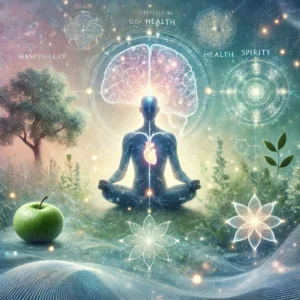Holistic Approaches to Healing: Integrating Mind, Body, and Spirit
In today’s world, holistic approaches to healing have become an essential path for those seeking balance by integrating the mind, body, and spirit. This approach doesn’t just target symptoms but looks at the whole person, treating the root cause of any imbalance.
What is Holistic Healing?
Holistic healing focuses on the belief that well-being is not just about treating physical ailments but also includes emotional, mental, and spiritual health. Rather than isolating symptoms, holistic approaches emphasize harmony between the mind, body, and spirit, using a mix of traditional medicine and alternative therapies like yoga, meditation, reiki, and herbal remedies.
Why Integrating Mind, Body, and Spirit is Essential
Holistic health emphasizes the deep connection between the mind, body, and spirit. Stress, for example, impacts not only mental well-being but can also manifest as physical symptoms, such as headaches or digestive issues. Unresolved emotional issues, similarly, might contribute to chronic pain. By addressing these interconnected aspects of our being, holistic healing promotes balance and deeper healing.
Key Holistic Healing Therapies
1. Yoga
Yoga is a practice that combines physical movements with breath control and meditation, aiming to unite the mind, body, and spirit. Through regular yoga practice, you can experience physical strength, emotional stability, and spiritual awareness. It’s an essential tool for anyone pursuing holistic health, offering benefits like stress reduction, mental clarity, and emotional balance.
2. Reiki
Reiki is an energy healing practice where a practitioner transfers universal energy through their hands to the recipient, clearing energy blockages and promoting healing. By realigning your energy flow, Reiki aids the body’s natural healing processes and restores balance in the mind, body, and spirit.
3. Meditation
Meditation is a key practice in holistic healing, helping individuals to quiet the mind and tune into their spiritual selves. Daily meditation lowers stress, promotes emotional clarity, and fosters inner peace. The increased mindfulness from meditation helps individuals address emotional triggers and strengthens emotional health.
4. Herbal Medicine
Herbal medicine uses plant-based remedies to support the body’s natural healing abilities. From soothing teas to anti-inflammatory herbs like turmeric, this practice targets both physical ailments and emotional well-being. Herbs like lavender and chamomile are frequently used to promote relaxation and improve sleep quality, illustrating the holistic connection between mind and body.
Spiritual Healing and Its Impact on Wellness
Spirituality plays an important role in holistic approaches to healing, even though it is often neglected in mainstream medicine. Whether through prayer, mindfulness, or connecting with nature, spiritual health contributes to overall wellness. Practices like chakra balancing or sound healing help realign the body’s energy centers, releasing emotional and energetic blockages that hinder healing.
Integrating spirituality into healing practices not only fosters inner peace but also helps individuals find a deeper connection to themselves and the world around them. This, in turn, promotes a sense of purpose, emotional resilience, and long-term well-being.
Benefits of Holistic Healing
By embracing a holistic approach to healing, individuals gain multiple benefits:
- Improved Mental Health: Meditation, yoga, and Reiki all help reduce anxiety, improve focus, and foster emotional stability.
- Better Physical Health: Holistic practices target the underlying causes of physical imbalances, promoting faster recovery and stronger immunity.
- Enhanced Self-Awareness: Through regular mindfulness practices, individuals become more attuned to their emotional and physical needs.
- Spiritual Connection: Nurturing your spiritual health through practices like meditation or energy healing fosters a deeper sense of peace.
- Long-Term Wellness: Holistic healing prioritizes long-term balance and health rather than temporary relief from symptoms.
How to Incorporate Holistic Healing into Daily Life
You don’t need to overhaul your entire lifestyle to integrate holistic healing into your routine. Simple practices like starting your day with meditation, practicing yoga for even 15 minutes, or drinking herbal teas for stress relief can have a profound impact on your overall well-being. Prioritizing self-care, such as journaling or taking mindful walks in nature, helps maintain the balance of your mind, body, and spirit.
Conclusion
Holistic approaches to healing highlight the importance of treating the mind, body, and spirit as a unified system. By embracing therapies like yoga, Reiki, meditation, and herbal medicine, individuals can restore balance and enhance their overall well-being. When all parts of our being—mental, physical, and spiritual—are in harmony, true healing takes place. These integrative methods create a path toward sustainable health, allowing individuals to thrive physically and emotionally.
By adopting holistic approaches to healing into your daily life, you can nurture the connection between your mind, body, and spirit, and begin to experience profound, long-lasting well-being.

